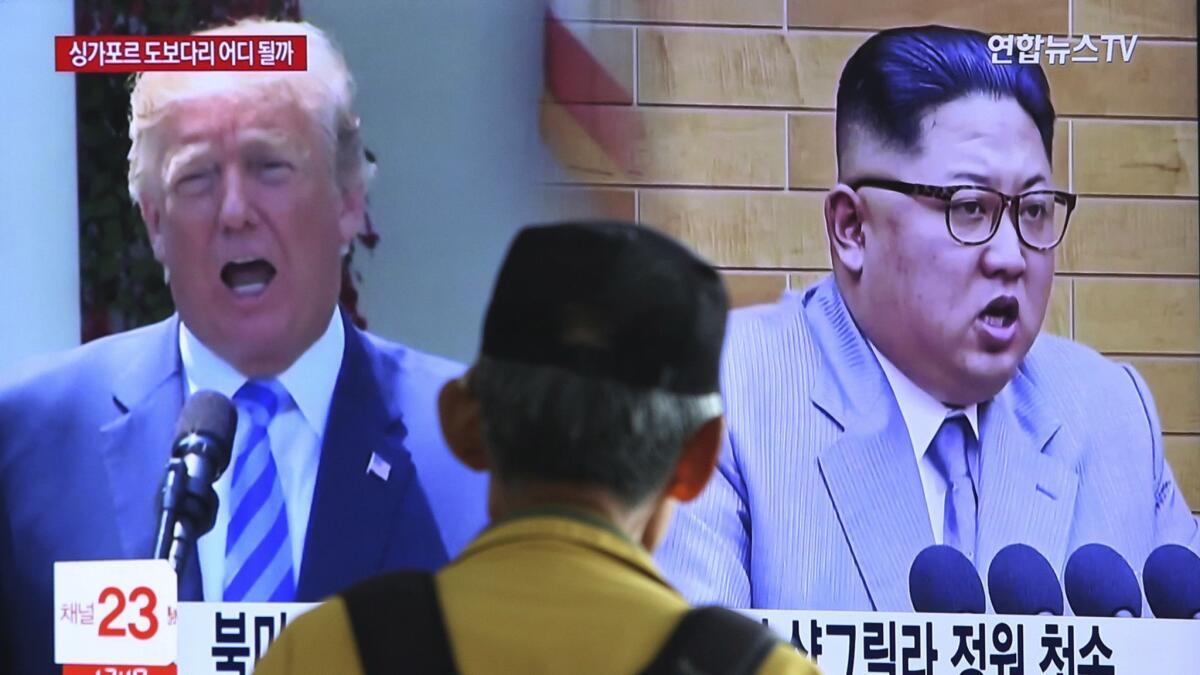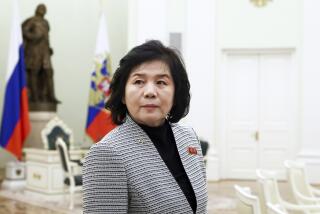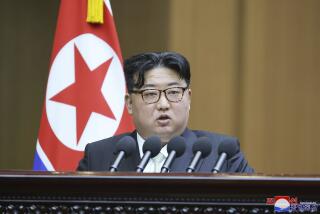North Korea threatens to cancel summit with Trump; White House insists the meeting is still on

North Korea threatened Wednesday to call off a planned summit between its leader, Kim Jong Un, and President Trump, rejecting the administration’s demand for what it called “unilateral nuclear abandonment.”
Trump and his national security advisor, John Bolton, have repeatedly said that the U.S. goal in the scheduled talks is for North Korea to fully give up its nuclear program, which the North has spent decades building.
Bolton recently held out Libya, which did abandon a much less advanced nuclear program more than a decade ago, as an example for Pyongyang to follow. A few years later, Libya’s leader, Moammar Kadafi, was overthrown by rebels backed by western governments, making the example a deeply unpalatable one for North Korea.
The North Korea statement denounced the U.S. negotiating approach.
“If the U.S. is trying to drive us into a corner to force our unilateral nuclear abandonment, we will no longer be interested in such dialogue and cannot but reconsider our proceeding to the DPRK-U.S. summit,” wrote Kim Kye Gwan, a longtime North Korean diplomat who serves as the first vice minister for foreign affairs, using the abbreviation for the Democratic People’s Republic of Korea.
Trump, responding to a question during a photo session with the visiting president of Uzbekistan, Shavkat Mirziyoyev, said the U.S. had not heard anything official from North Korea.
“We haven’t been notified at all, we’ll have to see. We haven’t received anything, we haven’t heard anything. We will see what happens,” Trump said. “We’ll see what happens.”
Earlier, White House Press Secretary Sarah Sanders, said the North Korean statement was “something that we fully expected.”
“If they want to meet we’ll be ready, and if they don’t, that’s OK too,” she said.
In a further public show of lack of concern, the State Department released a statement on a telephone call Secretary of State Mike Pompeo had with the foreign minister of Singapore on Wednesday. In the call, Pompeo thanked Singapore for its “willingness to host President Trump’s meeting with North Korean leader Kim Jong Un on June 12,” the statement said.
The North Korean statement went considerably beyond an earlier release by the official North Korean state media agency which complained about an annual military exercise with South Korea.
North Korea experts said that the sudden change of tone from Pyongyang follows a longstanding pattern for the North of trying to keep the other side in a negotiation off balance by alternating bellicose and more conciliatory statements.
“It’s a shot across the bow,” said Bruce Klingner, a senior research fellow for Northeast Asia at the Heritage Foundation in Washington. “It’s a reversion to the more traditional North Korean approach of threats and provocations and signals of criticism.”
The statement comes less than a month before the scheduled summit between Kim and Trump -- the first face-to-face meeting between sitting leaders from the two nations.
Analysts cautioned that declaring the summit dead would be premature.
“It’s more of a hiccup than a blowup,” said John Delury, an associate professor of Chinese Studies at Yonsei University in Seoul. “It will depend on Trump’s reaction.”
But the statement highlighted a reality that has been obscured by weeks of warm diplomatic statements and by the speed with which the summit meeting was agreed to — the Trump administration and North Korea have vastly different goals going into their negotiations.
Moreover, Trump, with his celebratory comments in the last few weeks and suggestions that he deserves a Nobel Peace Prize for his Korea diplomacy, may have set himself up for being whipsawed by Kim and his advisors, who are following a diplomatic playbook honed through three generations of their family’s rule over North Korea.
Get the latest news from the nation’s capital on Essential Washington >> »
“I could certainly see this as a negotiation strategy on North Korea’s part to paint the U.S. and South Korea as acting against good faith,” said Timothy Rich, an associate professor of political science at Western Kentucky University whose work focuses on East Asia.
“The challenge now is to determine what North Korea wants to return to the table or if this was a planned umbrage to deliberately slow down dialogue.”
The North has had a nuclear program for decades despite past agreements to halt its efforts, and in recent years has amassed as many as 60 weapons. In a series of provocative test launches last year, it also demonstrated the theoretical capacity to deliver warheads to the U.S. mainland with ballistic missiles.
North Korea’s efforts have brought years of international condemnation and economic sanctions, and the North has generally responded with threats and bellicose rhetoric. The tone of the North Korean statements changed slightly on New Year’s Day, when Kim Jong Un gave a speech touting his nuclear prowess but also his desire for better relations with the South, with which it’s still at technically at war after more than six decades.
What followed was a flurry of remarkable diplomatic activity, leading to joint participation between North and South Korea in the Winter Olympics. Talks continued after the Games, leading to the first top-level meeting between the leaders of the estranged countries since 2007 in April at Panmunjom, a diplomatic outpost along the border separating the two.
Analysts differed in their conjectures about why the North Koreans suddenly changed their tone.
Bolton’s recent comments may have prompted the North to lash out. The vice foreign minister’s statement mentions him personally, perhaps in an effort to set terms for the new summit.
“Because the summit has been agreed upon so suddenly, so quickly, that there is no time for either side to clarify their positions,” Go Myong-hyun, a research fellow at the Asan Institute for Policy Studies in Seoul. “In the process, the United States has come across — from North Korea’s point of view — as uncompromising and imposing. Maybe that’s why North Korea is reacting this way.”
Others said the North’s move showed clumsiness more than careful planning — a relapse to its old behavior which undermined progress it had made on the world stage.
“This also shows that Kim Jong Un’s diplomacy lacks finesse,” said Bong Young-shik, a visiting research fellow at Yonsei University.
Relations may also have been inflamed by Thae Yong Ho, a top North Korean diplomat who defected in 2016 and has been making the media rounds in Seoul in advance of his new book. He gave a talk at the National Assembly last week in which he speculated about Kim’s plans for the North’s economy, among other things.
The North Korean statement accused the South of allowing “human scum to brazenly hurl mud at the dignity of the supreme leadership of the DPRK … in front of the building of the National Assembly.”
Meanwhile on Wednesday, South Korean officials in President Moon Jae-in’s government reacted cautiously.
The South’s unification minister, often the government spokesman for inter-Korean issues, said Wednesday that he didn’t see the North’s statement as a threat to the recent improvement in relations, which has been a top priority of Moon since he took office just over a year ago.
“What’s important is to not stop in the face of such situations and to consistently continue to step forward,” the minister said. “On that point, I think both we and the North agree.”
In their meeting last month at Panmunjom, Kim and Moon agreed to a joint declaration that set a goal of denuclearization and better relations ahead of the meeting with Trump.
Pompeo has visited Pyongyang twice since Easter, and last week secured the release of three American prisoners jailed there.
Both the U.S. and South Korea said that the military exercises, which the North Koreans objected to, would continue.
On Tuesday, North Korea’s official Korean Central News Agency denounced the exercises, which began Friday, as a “deliberate military provocation” designed to disrupt the “favorably developing situation on the Korean peninsula.”
The air force exercises were an “undisguised challenge” to the joint declaration that Kim and Moon signed, the statement said.
“The U.S. will have to think twice about the fate of the DPRK-U.S. summit,” it added.
The statement came the day the North and South were expected to hold another round of talks at Panmunjom. That meeting was “indefinitely postponed” by the North, according to South Korea’s Unification Ministry.
The negotiators were to include Kim Jeong-ryeol, the South’s vice transportation minister, and Kim Yun Hyok, the North’s minister of railways, suggesting the two sides might explore ways to improve cross-border travel.
Other negotiators were to include officials on both sides with responsibility for unification issues and sports. The two countries have been exploring opportunities for combined sports participation, perhaps at the upcoming Asian Games in Jakarta, Indonesia, that would be modeled after the joint hockey team they fielded at the recent Winter Olympics.
Scott Snyder, a senior fellow for Korea studies and director of the program on U.S.-Korea policy at the Council on Foreign Relations, said North Korea’s decision to “play hard to get” ahead of the summit shouldn’t be a surprise.
“North Korean behavior is reverting to form,” he said. “There will be threats to pull the plug on both sides before Kim and Trump actually meet.”
For more on Politics and Policy, follow me @DavidLauter
Lauter reported from Washington and special correspondent Stiles from Seoul. Staff Writer Tracy Wilkinson in Washington contributed to this report.
UPDATES:
11:35 a.m.: This article was updated with a statement from the State Department.
9:20 a.m.: This article was updated with a comment by President Trump.
8:15 a.m.: This article was updated with White House comment and additional analysis.
The article was originally published at 4:10 a.m.
More to Read
Get the L.A. Times Politics newsletter
Deeply reported insights into legislation, politics and policy from Sacramento, Washington and beyond. In your inbox three times per week.
You may occasionally receive promotional content from the Los Angeles Times.







